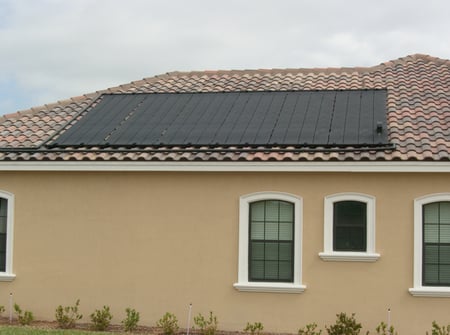Just because you have a pool doesn’t mean you have expendable funds to heat it. And heating it doesn’t have to be a luxury! You might have heard about the many different ways to heat pools and their pros and cons. There are many types of pool heaters, but some of them can be more cost-efficient than others, like electric pool heaters and solar pool heaters. Comparing these two types of popular pool heaters can help you decide which is the right option for your pool and your budget.
 How They Work
How They Work
Electric: There are two types of electric systems to consider for pool heating. Electric resistance pool heaters generate their heat from electric currents, while electric heat pumps transfer heat from the surrounding air or water. This makes heat pumps incredibly more efficient than electric resistance heaters because they capture heat instead of generating it.
Solar: In solar pool heating, solar panels are used to capture the sunlight and gather the heat from it. The pool water circulates through a solar collector, normally located on your home’s roof or in the the yard. As the water passes through the panels, it becomes heated, then the newly-heated water is pumped back into the pool. An automatic valve within the system discerns between filtered water without a second pump and with very little back pressure on the existing pump. Not only that, but there are no pollution emissions or additional energy costs from solar panels, making it very eco-friendly. Solar energy can continuously heat your pool, meaning your pool is ready to enjoy at any time without thinking ahead and while reducing your monthly energy bills.
Cost
Electric: According to the U.S. Department of Energy’s annual cost analysis, heat pump systems cost significantly lower than electric resistance heating, but cost more at first in the upfront costs - up to $5,000. Electric resistance heating costs only about $1,000 to $2,000, but in installation, labor, and materials, it can be two to three times the average price of installing a heat pump system at $300 to $500 because of the additional wiring upgrades within your home system. Electric resistance heaters require heavy-duty wiring and large-amperage circuit breakers, all while not being energy efficient. With those steep upfront costs in addition to about $500 a month for an electric resistance system, heat pumps at $100 a month are the cheaper option in the long term. Additionally, heat pumps reliant on air are dependent on the temperature of the air, making them slow to heat up pool water and barely functional below a certain outdoor temperature.
Summary:
- Electric resistance heating costs: $500/month + $2,000 + $1,000 = $9,000
- Heat pump heating costs: $100/month + $5,000 + $500 = $6,700
Solar: Solar panels have no monthly costs and $0 down with Superior Solar, but they are more expensive than electric or heat pumps. Luckily, many trusted dealers have financing options and locked-in rates to make them more affordable. And, your energy bills will decrease when you switch to solar energy. Most homeowners can pay off their solar pool panel investment in 2 to 5 years.
Summary:
- Solar panel heating costs: $0 down + low monthly payments!
Maintenance
Electric: Heat pump pool heaters can last from 10 to 20 years and electric resistance heaters typically last 5 to 10 years, if they have absolutely no problems and are well maintained. However, you should also invest in pool covers and other items to conserve energy and lower your costs. These items, just like the heat pump and electric resistance heater, will need to be replaced as they deteriorate.
Solar: Solar panels for pools have very little maintenance requirements and still last for decades, up to 20 years! They use a renewable energy source and emit no air pollution, and only need occasional rinsing off - which is usually taken care of each time it rains. Plus, trusted companies like Superior Solar have strong warranties and certified technicians available 24 hours a day, 7 days a week, in the rare case anything comes up.
Ultimately, the most affordable and energy-efficient option to heating your pool any time you want to use it is harnessing the free energy of the sun, especially in the Sunshine State. An investment in solar panels is not only better for the planet, it’s better for your wallet! Get a free home analysis and quote to start saving up to 80% with Superior Solar!


